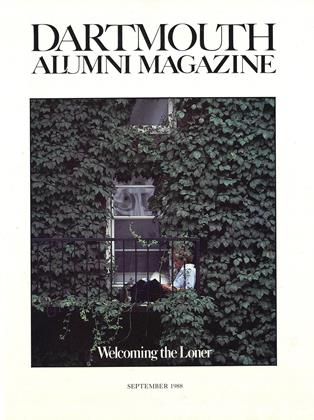The open-minded job seeker has a good shot.
With an unemployment rate of less than one percent, the Upper Valley looks like an employee's market, but job-seekers from the outside be forewarned: salaries are much lower than in metropolitan areas.
Of the five largest employers, three (Dartmouth-Hitchcock Medical Center, the College and the local school district) are nonprofit. The area's manufacturing sector is based on high-tech industrial products. This mix of service and industry produces a fairly stable economy, according Janet Gelfant, editor of the Valley Business Journal. "The Upper Valley is less vulnerable to swings caused by changes in the amount of disposable income and foreign trade," she says. Gelfant predicts that the region's bull market will last well into the next decade. The growth will be sparked, in part, by the Medical Center's building project and an adjoining research park.
Despite the bright future, however, neither the nonprofit nor the high-tech sector tends to produce impressive salaries. "For most jobs, Dartmouth simply doesn't pay as much as employers in the major urban areas," says Ken Freeman, manager of employment and employee relations at the College. Freeman reports that the best professional jobs both inside and outside of the College—generally cluster in the $25,000 to $50,000 range.
A systems analyst commanding up to $55,000 per year in New York and Boston will earn no more than the low thirties working for Dartmouth. Similarly, a senior accountant earning $40,000 in Boston will find that the same job in New Hampshire pays somewhere in the thirties. A management-level accountant making $50,000 locally is worth between $60,000 and $70,000 in New York and Boston, according to Lynn Bates, director of personnel at the Lebanon office of the accounting firM of Smith, Batchelder and Rugg.
In the realm of education, the average New Hampshire school teacher earns about $24,000, or $4,000 less than the national average. In Hanover, one of the state's highest-paying districts, the average salary is $33,000.
Attorneys moving to the Hanover area can expect to see their earnings drop by as much as 40 percent, reports Dale Breed '79, a Hanover lawyer who relocated from Washington, D.C. She notes that there is a tradeoff: 70-hour work weeks, common at big-city firms, are rare in New Hampshire.
In general, professional opportunities are somewhat limited by the Upper Valley's small-town nature, despite its rapid growth. "Returning alumni may have difficulty finding jobs that pay $40,000 and up," warns Skip Sturman '70, director of Career and Employment Services at Dartmouth. "There are a limited number of jobs in a given field, and this can severely restrict the number of openings for people who, in mid-career, want to move to the area but are loath to lose the seniority they have gained in their former job."
Clearly, something more than a large salary lures people to Hanover. "We try to appeal to people for whom salary is not the only factor," says Dartmouth's Ken Freeman. "We emphasize the extracurriculars; the cultural and athletic opportunities at Dartmouth are great. And we try to compete on the quality-of-living issue, which can be important for people seeking a good environment in which to raise a family."
On the other hand, the environment Freeman touts isn't for everyone. Small-town America can be deadly for people without mates. Common problems faced by area singles are loneliness, boredom and the difficulty of meeting new people outside the workplace, according to Charlotte Sanborn, employee assistance counselor at the College.
Long-distance job-hunters can contact the College Personnel Office (603-646-3411) and ask for the booklet titled "Spouse Employment/Educational Opportunities," which profiles more than a hundred area employers. Another resource is the Dartmouth Jobline (603-646-3328).
Firms recruiting professional help often bypass the local media and advertise directly in national or regional papers, particularly the Boston Globe. Professional openings at the College are advertised regionally in the Globe or the Hartford Courant, and nationally in the Chronicle of Higher Education.
Play: Suzanne Wiley Young '77 remained in the Upper Valley in part because of the wide range of recreational activities. Young, a canoeing enthusiast, prefers the calmer waters of the Connecticut River when accompanied by her son Matt.
 View Full Issue
View Full Issue
More From This Issue
-
 Cover Story
Cover StoryWelcoming the Loner
September 1988 By Victor F. Zonana '75 -
 Feature
FeatureFrom America's Lost Cohort, the Shards of Souls
September 1988 By David R. Boldt '63 -
 Feature
FeatureIn the Galactic Search for Intelligence, We May Find Ourselves
September 1988 By Jack Baird -
 Feature
FeatureIS DARTMOUTH STILL DARTMOUTH?
September 1988 By Jay Heinrichs -
 Feature
FeatureHow to Come Back
September 1988 -
 Sports
SportsFall Sports Preview
September 1988
Article
-
 Article
ArticleRavine Lodge Nears Completion
February 1939 -
 Article
ArticlePresident of the Year
June 1975 -
 Article
ArticleThe Tucker Heritage
OCTOBER 1965 By FRANCIS LANE CHILDS '06 -
 Article
ArticleWestern New York
MARCH 1972 By FREDERICK D. TURNER '58 -
 Article
ArticleHanover Browsing
February 1950 By HERBERT F. WEST '22 -
 Article
ArticleERNST SNAPPER
January 1974 By R.B.G.


